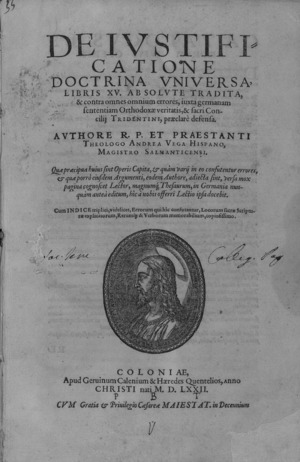Andreas de Vega facts for kids
Andreas de Vega (who died around 1560) was a Spanish religious scholar. He was also a member of the Franciscan Order, a group of friars.
Life
Andreas de Vega was born in a city called Segovia in Old Castile, Spain. He studied at the University of Salamanca. Later, he became a professor at that same university. While teaching, he joined the Observantine branch of the Franciscan Order. He kept teaching in the monastery where other scholars, like Alphonso de Castro, also taught. He passed away in Salamanca.
Vega followed a way of thinking known as Scotism. This was a philosophy based on the ideas of a scholar named John Duns Scotus. At the same time, he also respected the teachings of St. Bonaventure.
Emperor Charles V chose Vega to be a theologian at the Council of Trent. This was a very important meeting of church leaders. At the Council, Vega worked with Cardinal Petrus Pacheco. Cardinal Pacheco was a supporter of the Franciscan Order.
Vega played a big part in early talks about the canon of the Scriptures. This means deciding which books belonged in the Bible. He also discussed the Vulgate, which was the Latin version of the Bible. These discussions led to a new rule being made on April 8, 1546.
He was also very active in talks about justification. This is a religious idea about how people become right with God. Vega had debates with Dominicus de Soto, a scholar who followed Thomism. Thomism was another way of thinking based on the ideas of Thomas Aquinas. The final decision on justification was made on January 13, 1547.
Works
Before the Council of Trent, Vega wrote a book. It was called "De justificatione, gratia fide, operibus et meritis quaestiones quindecim" (Venice, 1546). In this book, he defended the Catholic Church's view on justification. He wrote it to argue against the ideas of Protestants.
After the Council made its decision, Vega wrote another book. This one was called "Tridentini decreti de justificatione exposition et defensio lib. XV distincta" (Venice, 1548). He wrote it to explain and defend the Council's decision on justification. In the last two parts of this book, he criticized John Calvin's writings. This book was Vega's most important work.
Peter Canisius had Vega's main work reprinted in 1572. It was published in one book along with his earlier work on justification. More copies were printed in 1585 and 1621.
After Vega died, another one of his works was published. It was called "Commentaria in Psalmos" (Alaclà de Henares, 1599). This book contained his comments on the Psalms, which are religious songs.
See Also
 In Spanish: Andrés de Vega para niños
In Spanish: Andrés de Vega para niños
 | William M. Jackson |
 | Juan E. Gilbert |
 | Neil deGrasse Tyson |


